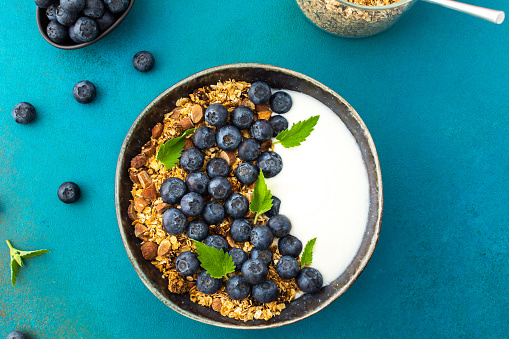This is what a nutritionist recommends eating to stay focused during the warm weather
Between the hot, muggy weather and the endless stream of poolside pictures your mates keep uploading to Instagram, motivation and concentration have never been lower. Can our daily diets help to push through the brain fog? Leading London-based nutritionist and dietitian Reema Patel believes so.
It’s been nigh-on impossible to concentrate for the past four weeks.
August is always a tricky time to be working, but this year has been especially challenging. It’s hot and muggy, and our social media feeds are overflowing with photos and reels of our mates riding inflatable swans across pools and people having breakfast beers on their balconies at home.
You might think that there’s no point in trying to make much of an effort until the weather changes and September officially rolls in. And while there might be an argument for taking things a little slower in the build-up to a cooler season, it is worthwhile looking at how our diets can support us better.
Reema Patel is a dietitian and nutritionist for Dietitian Fit & Co, and she believes that our forks wield a lot of power when it comes to boosting cognitive function. So, what should we look to be adding to our breakfasts and lunches if we want to stay on high alert?
You may also like
Antioxident-rich baba ganoush recipe for protecting your brain cells and gut health
7 brain-boosting foods for increasing concentration and productivity
Boost brain health with omega-3-rich oily fish (or seeds for vegans)
Omega-3 fatty acids are known to help support productivity and brain health, and they’re most readily found in oily fish. “Much of the fat in our brain is composed of these fatty acids, and they are important for building nerve cells,” Patel explains.
Research has linked omega-3 intake to slowing down dementia, so Patel suggests that including at least one portion of oily fish a week “could certainly support our overall cognition”.
Think of sources such as:
- Mackerel
- Salmon
- Trout
- Sardines
- Anchovies
- Herring
Patel suggests: “Try a summery mackerel and baby potato salad, with asparagus and juicy cherry tomatoes, or enjoy some trout on the BBQ, finished off with a squeeze of lemon and served alongside some delicious BBQ vegetables.”

If you don’t eat fish, don’t worry: you can also get omega-3 fatty acids from plant-based sources such as flaxseed, pumpkin seeds and walnuts. While Patel warns that they don’t contain the optimal type of omega 3 for brain health, “the body can convert these into the more optimal forms, which are called docosahexaenoic acid (DHA) and eicosapentaenoic acid (EPA). You may also consider taking an algae-based supplement, as these contain good levels of DHA and EPA.”
Snack on walnuts to reduce brain inflammation
Walnuts are such a versatile nut – they’re delicious cooked, raw, savoury or sweet:
- Drizzle in maple syrup and lightly roast for a crunchy desk snack
- Chop, raw, over your overnight oats or smoothie bowls
- Chuck whole ones into your salads (alongside a little cheese and apple)
- Make your own home-made pesto using walnuts instead of (very expensive) pine nuts
It’s not just that they’ve got great taste and texture; they also contain lots of vitamin E, which has been shown to reduce cognitive decline as we age.
“Polyphenols found in walnuts may help reduce oxidative stress and inflammation in the brain, which otherwise can increase the risk of Alzheimer’s disease,” says Patel. “Eating walnuts has been linked to better overall brain function with ageing.”
You may also like
Healthy pasta recipe: this nourishing walnut ‘chorizo’ sweet potato pasta is perfect post-workout fuel
Don’t ditch the carbs – load up on whole grains to protect your mental wellbeing
Think:
- Oats
- Brown rice
- Brown bread
- Quinoa
- Buckwheat
- Bulgar wheat
- Brown pasta
Most us know that whole grains are high in fibre, but you might not be aware that a recent study published in the journal Frontiers In Psychiatry has found that high fibre intake may be linked with lower levels of anxiety and depression.
“Dietary fibre is also beneficial for our gut microbes, which are linked to supporting our mental health and wellbeing,” Patel flags.
“To increase your dietary fibre intake, swap white pasta for brown, or combine a mix of both to ease you into the different taste. Switch up the grains you use at dinner – try quinoa some days instead of rice or couscous, or try throwing some bulgar wheat into a salad or soup.”
You may also like
Health recipes: fibre-packed chocolate, peanut butter and chickpea bars
Stock up on dark chocolate for better blood flow to the brain
Dark chocolate with higher levels of cocoa solids is a great source of those polyphenols, which, as we’ve already ascertained, can be important for brain health. Studies have shown that regular dark chocolate consumption can increase blood and oxygen flow to the brain, with young adults showing better cognitive performance.
“Combining dark chocolate and berries is the ultimate winning combination for a double boost in polyphenols,” Patel recommends. Someone crack out the Green & Blacks.

Remember to stock up on blueberries
“Blueberries, as well as other dark red and purple fruits and vegetables, contain compounds called anthocyanins, which are a type of polyphenol. Anthocyanin consumption has been linked to improving memory and cognitive deficits,” Patel says.
It’s worth saying that all berries are a good source of vitamin C, which has been shown to manage anxiety and stress. Stock up on frozen berries, which tend to be cheaper and last far longer (perfect for smoothies).

Start the day with an egg to remember all your important meeting info
It’s not just blueberries that are great memory aids; egg yolks are rich in choline, which contains the chemical acetylcholine – known for its memory boosting properties.
Patel says that eggs are a great choice for breakfast, scrambled or in an omelette with vegetables. She also recommends making a spiced egg curry.
Don’t eat eggs? Look out for B-vitamin fortified foods like plant milks and cereals.
You may also like
Is coffee good for your gut? A new study shows the beneficial impact on gut bacteria
Boost your mood, alertness and concentration with a good old cup of coffee
“That morning coffee may provide you with some great health benefits – including increasing alertness and concentration, as well as improving mood and limiting depression,” says Patel. “Everyone has a different tolerance level to caffeine, and too much may cause a small risk in anxiety and sleep disturbance, so it is important to know how much makes you feel good.”
She recommends getting into the habit of taking a proper break in the day away from screens to enjoy a cup of coffee. “Some research has shown that decreased sun exposure can increase probability of cognitive decline– so why not enjoy a refreshing ice coffee on a walk, getting in some sunshine and exercise all at the same time?”
Sounds like a plan.
Images: Getty
Source: Read Full Article
